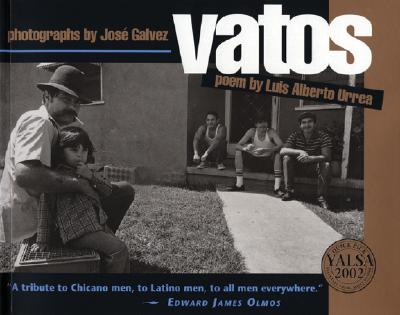22 May / Vatos | poem by Luis Alberto Urrea, photographs by José Galvez

 Luis Alberto Urrea‘s “hymn to vatos who will never be in a poem” provides the lyrical frame onto which Pulitzer Prize-winning photographer José Galvez showcases the everyday challenges and celebrations of the Latino experience. This slightly sepia-ed homage to masculinity-on-the-fringe was a 2002 Quick Pick for Reluctant Young Adult Readers from the Young Adult Library Services Association (YALSA) of the American Library Association.
Luis Alberto Urrea‘s “hymn to vatos who will never be in a poem” provides the lyrical frame onto which Pulitzer Prize-winning photographer José Galvez showcases the everyday challenges and celebrations of the Latino experience. This slightly sepia-ed homage to masculinity-on-the-fringe was a 2002 Quick Pick for Reluctant Young Adult Readers from the Young Adult Library Services Association (YALSA) of the American Library Association.
“Vatos,” Urrea explains, “– street slang for dude, guy, pal, brother– sprang from the highly stylized language of the Pachucos (los chukotes) in the ’50. It’s a Chicano term derived from the once-common friendly insult chivato, or goat. It had a slightly unacceptable air to it, which the Locos and Weesas of the Chico world enjoyed. They were able to take the sting out of racism by calling themselves a bunch of names assimilated ‘good Mexicans’ didn’t like.”
Here are the vatos: young and old, with their mothers, wives, girlfriends, and daughters, surrounded by their friends and rivals, fleeing and getting caught, working and waiting, singing and praying. Dressed up, dressed down, tattooed, uniformed, riding bikes and cars, the men and their families here are caught forever … never-changing, never wavering, the music always playing, the bodies smoothly swaying, the children forever playing.
Urrea’s hymn is a lulling chant, drawing you into a vast vato world, offering glimpses of solidarity and exclusion, struggle and joy. Each page is a near-wordless story, sometimes warm – “All the vatos and their abuelitos,” with a grandfather safely snuggling his sleeping grandchild in his arms – and sometimes mournful – “All the vatos sure that no one sees them,” sleeping off late night reveries sprawled across the front steps of a closed bar, a “Welcome Home!” sign ironically painted on the bar’s entrance doors.
For all the forgotten Latino men, Urrea rhythmically chants them back into existence. And page by page, with Galvez’s surprising, poignant, revealing photographs, the invisible men appear, ready to be recognized and ultimately remembered.
Readers: Young Adult, Adult
Published: 2000
